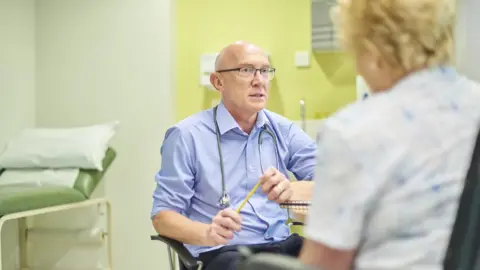NHS Wales: Chief executive predicts very busy winter
 Getty Images
Getty ImagesThe demand on Wales' NHS this winter could match last year's record-breaking pressures, its chief executive has warned.
The peak in 2022 came on 27 December, with some hospitals declaring "critical incidents" in the days afterwards.
Judith Paget said there was "no doubt" it would be very busy and demand could reach similar levels this year.
A new campaign has been launched pointing to alternative services to help ease the strain on GPs and A&Es.
Ms Paget said the NHS was working with ambulance, voluntary and social services to ease the strain but was still encouraging people to look for alternative options to frontline hospitals "because it will help us greatly".
Ms Paget pointed to the development of urgent primary care centres (UPCCs) and same day emergency care services (SDECS) which are now up and running across several sites in Wales.
UPCCs treat people with urgent primary care needs on the same day while SDECs help people access diagnostics and treatment for emergency care while being able to return home on the same day.
Neither offer walk-in appointments but can be accessed via a referral from a GP or an A&E unit.
Dr James Martin, a GP in Barry, Vale of Glamorgan was involved in setting up a UPCC to serve patients from seven GP practices and admits at the moment they are "a welcome drop, but it is a drop in the ocean".
But UPCCs can provide a service to patients who need to be seen soon.
"We have realised there's a cohort of patients who have things like pneumonia or abdominal pain, which has suddenly developed. or a bad urinary tract infection that needs to be seen promptly but not at the level where you would need to go to A&E and not necessarily seen by their regular doctor," he said.
The Welsh government said 10,000 people accessed UPCCs each month - there are 12 in five health board areas currently - while 14,500 have been treated in the 23 SDECs in the past three months.
Ms Paget also pointed to the advice available 24/7 on the NHS 111 Wales website which gets about 64,000 calls a month.
Only 11% of these end up being referred to an A&E unit, so Ms Paget said the wanted people to be able to make "informed decisions for themselves should they become unwell during the winter period".

She also admitted she has been concerned by some of the pressures already experienced by the NHS this autumn and was "worried" about the levels of strain around Morriston Hospital in Swansea which led to the ambulance service declaring an "extraordinary incident".
At one point 16 ambulances had been queuing outside the hospital's A&E with patients spending 28 hours waiting to be transferred inside.
But Ms Paget warned there were likely to be similar days during winter when the system "is under exceptional pressure".
What are winter pressures looking like?
Flu is at low levels in the community although there has been a recent increase in calls to 111 over flu-like symptoms - making up nearly one in five of all calls in the most recent week.
Patients are still testing positive for Covid in hospital - just over 400 in the most recent week - which is a slight drop on the previous week.
This is in line within the "most likely" scenario currently in the scientific modelling, with a peak not expected until late December.
Dr Rowena Christmas, chairwoman of the Royal College of GPs in Wales fears a "brutally hard winter".
"We keep saying 'unprecedented' but actually we can see it coming and I wish there was more in place to mitigate against that worry.
"I'm continually apologising, I'm doing my best but it's still a five-week wait to see me which still feels too long."
Health boards are being asked by Health Minister Eluned Morgan to make further cuts of £64m to reduce their overspends.
As a result she has warned extra beds might not be able to be opened as easily as in previous years as hospitals try to reduce their use of expensive agency staff.
Earlier, BBC Wales analysis suggested health boards could overspend by about £800m by the end of March 2024 having previously predicted overspends of £640m.
But they have been warned by Ms Morgan to reduce that initial £650m by 10% over the course of the winter
Ms Paget insisted she would not allow health boards to put patients at risk in an effort to drive down costs, saying their safety was "clearly our number one priority".
She added: "They will make their own judgments about the balance of how they need to make those savings versus making sure that they continue to provide the care that patients need."
She said it was not a new issue and she was confident the right decisions would be made and insisted she would "absolutely not" let health boards put patients at risk.

- KEEPING THE FAITH: Can Wales stay at the top of their game?
- KIRI'S TV FLASHBACK: Kiri Pritchard-McLean dives into the TV archives

